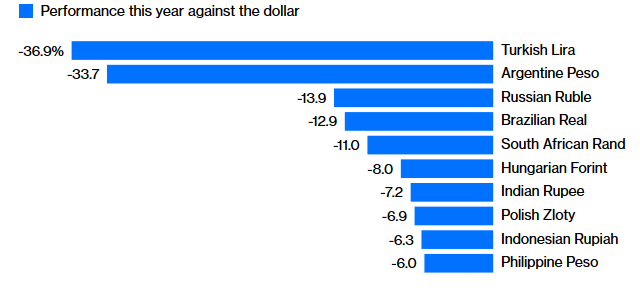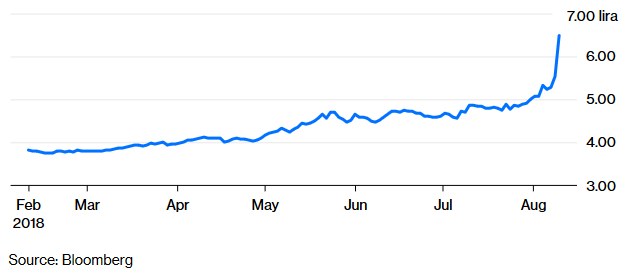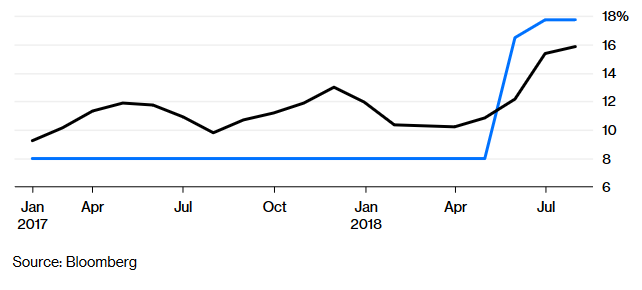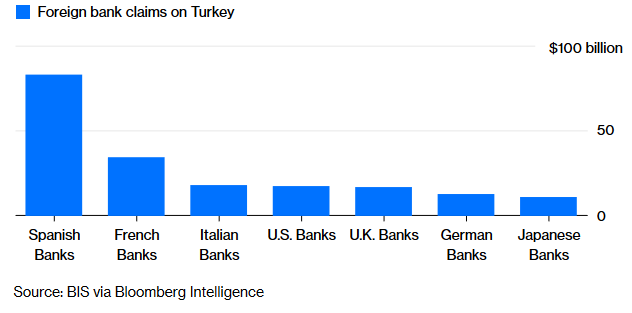Translated from Arabic by
Microsoft
The Republican People's spokesman commented on Erdogan's call for the Turkish people to convert their savings to lira. That points to your subjugation, Erdogan. Why do people have to $$ turn it into a pound, start yourself, Erdogan, and about the $15 million you trade on the Isle of Man and the money trading funds you and your nearest lira
#
Translated from Arabic by
Microsoft
-Trump announces that he ordered double tariffs on steel income of 20 percent and aluminium 50 percent from Turkey, and also announced that America's relations with Ankara are not good--and economist Vince Cignarella Beris to reduce the Si& classification agency of ;P Turkey's credit next Friday. The lira recorded Now 6.34 in front.
Translated from Arabic by
Microsoft
The chief editor The economics
@FT says the Turkish economy is passing by hard times the second one is the worst currency the world in terms of performance 2018 where it lost 30% of its value since the beginning of 2018 and lost 10% beginning of August and the country is going to dictatorship and commenting on the economical model announced by the brother of Erdogan Hezod worries Investors
Erdogan Is Refusing to Accept Economic Reality
The pleas of the currency have gone unanswered
August 10, 2018, 3:28 PM GMT+2
Asking your citizens to search under their pillows for foreign banknotes and gold to convert into domestic currency isn't much of an economic strategy at the best of times. When your currency has lost more than a third of its value against the dollar this year and is trading at a record low, it amounts to economic suicide.
In Last Place
The Turkish lira is the world's worst-performing currency this year
Source: Bloomberg
Any investors who'd been hoping for some semblance of standard economic theory taking hold and reversing the Turkish lira's freefall got scant comfort from Friday's speech by Turkish President Recep Tayyip Erdogan. "Turkey won't surrender to economic hitmen," he said, accusing detractors of hatching an "interest rate plot" that is "no different than a military coup attempt."
Unfortunately, U.S. President Donald Trump took to Twitter to feed Erdogan's conspiracy theories, announcing a doubling of tariffs on steel and aluminum and cheering on the lira's collapse.
The lira duly extended losses that have seen it weaken past 6.5 lira per dollar as it lost more than 21 percent of its value in the past five trading sessions alone.
In Freefall
The Turkish lira has lost a quarter of its value against the dollar in the past month
Investors are dumping Turkish assets on concern Erdogan's unconventional view that higher interest rates stoke inflation is hobbling the country's supposedly independent central bank. Policy makers left Turkey's key interest rate unchanged at 17.75 percent when they met last month, compared with economists' forecasts for an increase to 18.75 percent.
With inflation running at 15.85 percent, that leaves the real interest rate below 2 percent -- an inadequate response to consumer prices accelerating at three times the central bank's target rate.
Not Helping
Turkey's central bank surprised economists by leaving rates unchanged last month
The stakes are high. Turkey's domestic institutions have more than $40 billion of dollar- and euro-denominated bonds and loans maturing by 2020, according to data compiled by Bloomberg Intelligence. Every lurch lower in the lira makes servicing those debts more expensive.
Meantime, foreign banks have exposure to Turkey worth about $224 billion, according to data from the Bank for International Settlements. If the U.S. imposes economic sanctions in retaliation for Turkey's refusal to free American pastor Andrew Brunson, arrested almost two years ago and accused of supporting terrorism, they may be forced to cut those exposures.
Sanctions Scenario
U.S. sanctions would threaten $224 billion of foreign bank exposure to Turkey
Global investment banks paid fines and penalties worth almost $6 billion to U.S. regulators for doing business in dollars with countries such as Iran that were the subject of U.S. sanctions; they're unlikely to risk a repeat performance over Turkey.
Erdogan's defiant stance probably reduces the risk of the nation introducing capital controls or seeking a bailout from the International Monetary Fund. Both would be deemed a capitulation in what he called "the economic warfare" being waged against Turkey.
So all eyes turn again to the central bank to see if it can find its collective backbone and introduce the higher interest rates needed to stem the lira's rot. "The central bank's independence is of critical importance to Turkey's economy," Turkish Finance Minister Berat Albayrak, who is also Erdogan's son-in-law, said on Friday.
He's absolutely right. But unless policy makers exercise that alleged independence – and do so before their next scheduled meeting on Sept. 13 – there's little prospect of the lira recovering.
This column does not necessarily reflect the opinion of the editorial board or Bloomberg LP and its owners.
Who Has The Right To Resources In The Caspian Sea? | OilPrice.com
Aug 08, 2018, 11:00 AM CDT
August 12th, 2018 could well become a historic day for the Caspian Sea region, with states aiming to end a long-running legal disagreement involving the areas natural resources. Since the breakup of the Soviet Union in the region, Azerbaijan, Kazakhstan and Turkmenistan have all been battling with Russia and Iran for their share of the resource pie in the area. In the coming days, we may well see the resolution of this issue.
For nearly three decades, negotiations have been ongoing on the territorial status of the Caspian Sea and the distribution of its wealth. During the discussions, Russia and Iran formed a bloc as the states with the least energy resources in their territorial waters, while Azerbaijan, Turkmenistan, and Kazakhstan formed another. The latter three insisted that only the countries through whose territory a future pipeline would be traversing should decide on its fate. Moscow and Tehran, however, insisted that all littoral states of the Caspian should receive
an equal say in the final decision.
After years of negotiations, Russia and Iran appeared to have finally given in and made a serious concession: article 14 of the agreement forfeits control over the construction of any possible future pipeline. This triumph looks like it will be short-lived however, as an agreement on the environment provides them with a Trojan horse.
On July 20th, the littoral states signed the
Environmental Impact Assessment Protocol, an annex to the convention, which makes all five states equal partners when it comes to safeguarding the environment. According to the terms of this agreement, all states are allowed to request explanatory argumentation on how environmental concerns are going to be met. In case the plaintiff is not satisfied, an appeal at an international court remains open, which could delay a project for years if not a decade.
Despite seeming to be a bad deal for Azerbaijan, Turkmenistan, and Kazakhstan in the short term, it makes more sense when taking into account other considerations. Azerbaijan shares the
Araz-Alov-Sharg oilfield with Iran and the Serdar-Kapaz and Azeri-Chirag-Guneshli oil and gas fields with Turkmenistan. Until the territorial delimitation of the sea has been agreed upon, exploitation of these resources is not possible. Kazakhstan, despite it being in its interest to have alternative routes to Europe for its energy products, eventually sided with Russia due to obvious economic and political reasons.
Moscow, on the other hand, had several more reasons to make a concession on article 14 than the environmental protocol. In order for the Trans-Caspian pipeline from Turkmenistan to Europe to be realized, production capacity has to be available. Currently, Turkmenistan exports a significant part of its production to Russia and until 2020 should transport 35 bcm yearly to China via the Central Asia-China line. Due to existing commitments and low production capacity, it will be difficult to fulfill all the existing responsibilities while exporting additional volumes to Europe.
Furthermore, Moscow is confident that pipeline politics is on its side. The construction of infrastructure over hundreds and thousands of miles is an expensive endeavor which requires commercial viability in order to receive financing. Profitability is strongly influenced by the presence or absence of competition. The construction of
Turk Stream, exploitation of energy resources in the
Eastern Mediterranean, and LNG will all have a negative impact on prices and will hurt producers in the Caspian Sea region.
While Turkmenistan, Azerbaijan, and Iran are now able to exploit shared oil and gas fields, Russia can block alternative suppliers to Europe for the foreseeable future. All the involved parties, with the exception of Turkey, seem to have gained some advantage. Ankara was poised to become a major transit hub for energy to Europe from the Caspian. Turkey appears to have miscalculated the level of support it would receive from the EU in its aim to become an energy hub. Financial uncertainty and political stalemate will prove difficult hurdles to realize an alternative source of energy to Europe in the foreseeable future.
By Vanand Meliksetian for Oilprice.com
Putin, Erdogan hail implementation of joint energy projects
August 10, 17:29 UTC+3
The two leaders also discussed schedule for further contacts at various levels
MOSCOW, August 10. /TASS/. Presidents Vladimir Putin of Russia and Recep Tayyip Erdogan of Turkey have positively assessed the implementation of joint projects, in particular in the energy sector, the Kremlin press service said on Friday after their telephone conversation.
"The presidents discussed the current state and prospects for further development of mutually beneficial trade and economic cooperation between the two countries," the Kremlin said.
"They positively assessed the implementation of joint strategic projects, first of all, in the energy sector."
The two leaders also discussed schedule for further contacts at various levels.
A source in the Turkish president’s administration told journalists earlier that the two presidents had discussed latest development in Syria and settlement efforts in the Astana format.
Enrico Ivanov ☦ on Twitter
10:29 AM - 10 Aug 2018
"This Crisis Is Created By America":
#Turkey Blames
#Trump For Economic Collapse.
"This Crisis Is Created By America": Turks Blame Trump For Economic Collapse






